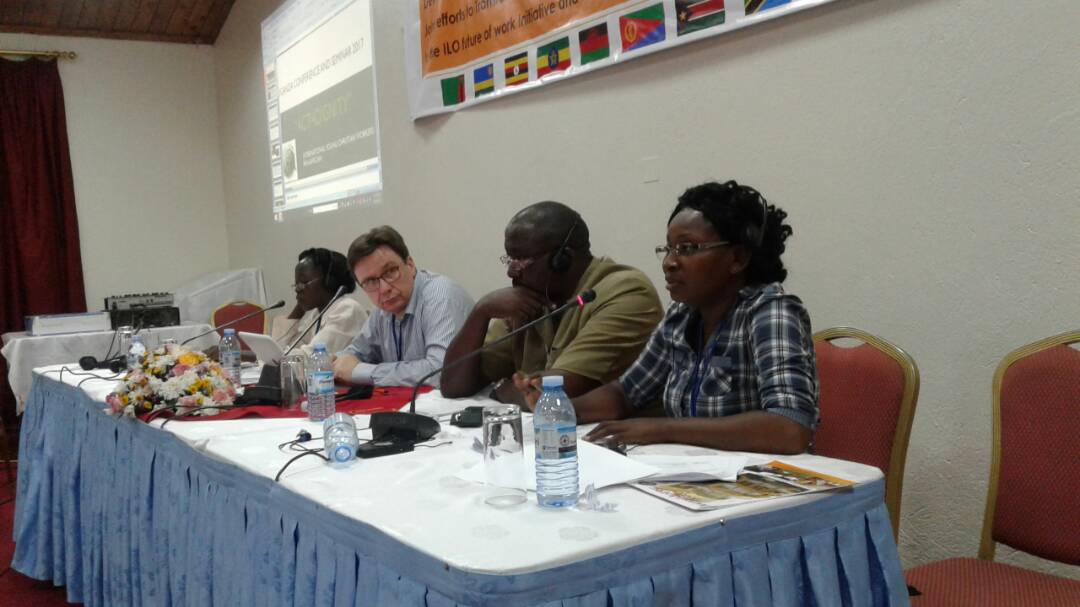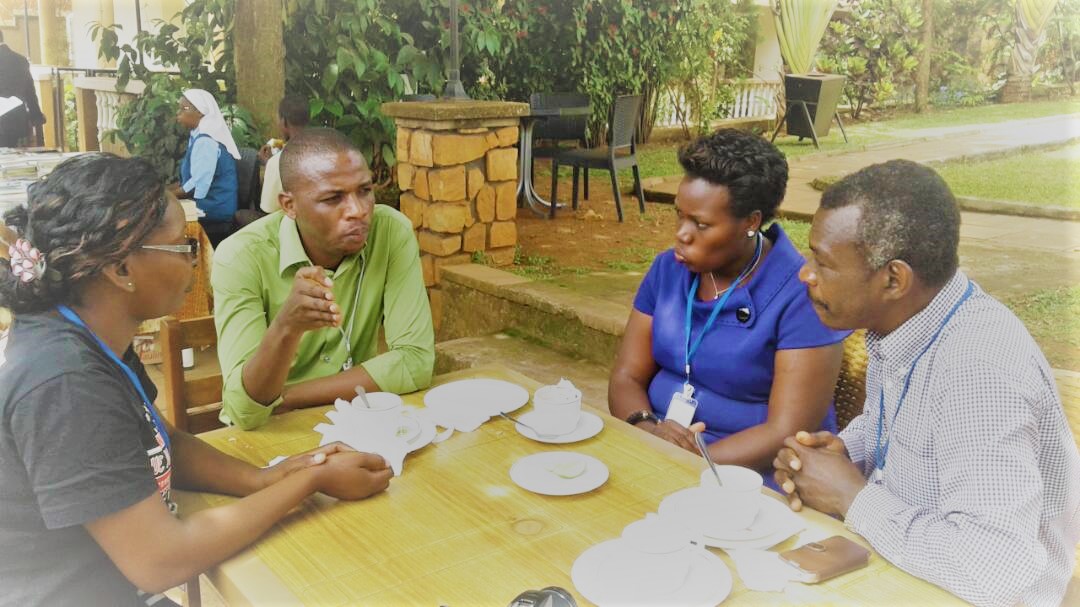
An interreligious conference was held in Uganda from April 25-28, 2017 to deliberate on working conditions in relation to the ILO future of work initiative and the sustainable development goals. It was co-organized by the Justice and Peace Department of the Uganda Episcopal Conference, Kolping International and the International Labor Organization, with the participation of around 65 people from various countries of Africa. Doriabelle Yongala, representative of the International Young Christian Workers Panafrican Team (Panaf), presented the reality of young workers in Gabon and shared the continental analysis on the growing unemployment rate, informalization and the increasing life and work precariousness facing young people.
On Youth and Unemployment
The Conference not only took place in the meeting room, but participants also had the opportunity to visit workers in the informal sector like motorcycle taxi drivers, brickmakers, car mechanics and nurses to see concrete reality.
Many young people in Africa are unemployed. In order to respond to the problem, some organizations provide training sessions on administrative skills like drafting and writing CVs, job applications, cover letters, etc. However, governments must play their role in youth employment and be a pioneer for job creation.
On Environment and Climate Change
The conference debated the causes and consequences of the climate change on the lives of young people. Due to excessive use of natural resources, forests, waters and mountains, we are facing water problems, drought, which affect food production, generate new diseases and infections, wildfires in forests, a reduction of biodiversity and the depletion of natural resources.
In order to resolve this problem, all actors should be involved in developing soil irrigation techniques, small subsistence farming and they should use drought resistant seeds. At school level, environmental studies should be introduced. Networking between various organizations and countries is important to lobby and advocate for the protection of the environment.
On Gender Development and Non-Discrimination Based on Sex
In Africa, women, domestic workers and migrants are discriminated, harassed, exploited and abused mentally, physically and sexually at work and in the society. Their whole life is unsecure due to discrimination and less access to education and work.
Young women and men must be freed from all types of harassment. There should be equal job opportunities. Women must be encouraged to be part of the decision-making process. A dialogue should be established between men and women so that each one is aware that women have the same capacities as men.
On Employment and Immigration
Many people in Africa face insecurity at work; work is designed to be more vulnerable, flexible, and temporary. Jobs are not distributed equally among cities and countries, which cause young workers to migrate to seek employment and accept jobs in vulnerable situations, away from their family, without security and social protection.
However, immigration is bringing some positive aspects like transfers of funds, technologies, or skills. Governments should pass laws to protect migrant workers.
The Role of the Church in Improving Working Conditions
The teaching of the Catholic Church plays an important role in the world of work. The church encourages governments to review their labor law policy for the protection of workers. Work is an opportunity for personal fulfillment of a human being. For the church, work must be a right as described in the Bible. The priority of the church is to ensure the dignity and rights of all human beings and workers.
The Role of the State, Civil Society and Trade Unions
During the conference, delegates reiterated that the States should have a vital role to play in implementing labor laws and international conventions on human and workers’ rights, and equality at the working place.
Trade unions must facilitate negotiations between employees, employers and the State. They should fight for the respect of workers' rights at all levels. The civil society can assist trade unions in the implementation and follow-up of labor laws.
The Commitment of PANAF
Young workers need just work and dignified life to ensure they can live in harmony with nature now and tomorrow. The world needs a system that allows the equal distribution of wealth among all human beings and respects all human rights. Young women and men must be freed from sexual, mental and psychological harassment. Education must be universal.
To achieve this, the Panaf will continue raising awareness, training leaders and mobilizing young people at grassroots level and it will strengthen its networking with other like-minded organizations such as unions and social movements. For instance, after the Conference, a meeting between the IYCW Panaf Team and CIJOC national movements was held to develop collaboration in the African continent in the future.


